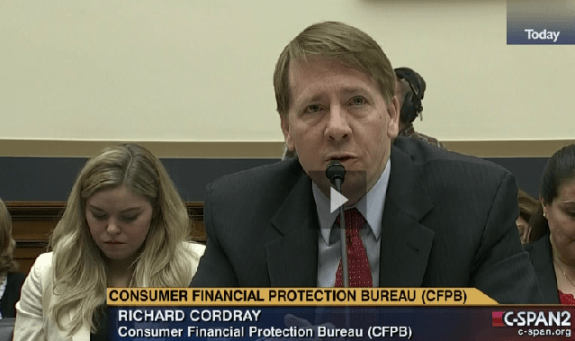
Consumer Affairs reporter Truman Lewis says mortgage lenders generally disregard MH lending because the demand is not great, which leaves the door open to five national MH personal property lenders.
However, smaller regional and local MH lenders exist, but CFPB regulations restrict sales people from referring consumers to them for fear of violating CFPB rules.
Dan Rinzema, president of MHVillage and DataComp says the government regulation is misguided and does not help the market for the resale of manufactured homes, which would help make MH a competitive housing choice. Doug Ryan, Director of Affordable Housing Initiatives at the Corporation for Enterprise Development (CFED), a non-profit that supports affordable MH, echoes CFPB’s claim that borrowers are vulnerable to expensive loan products.
Some Washington insiders say the report stems from the stiff grilling CFPB Director Richard Cordray received Jan. 28, 2014 at the hands of the House Financial Services Committee’s Subcommittee, and point to a video of that hearing.
The 55-page report alleges that 68 percent of all MH purchase loans in 2012 were chattel loans compared to three percent of site-built home loans, and included that two-thirds of MH loans were eligible for traditional mortgages but chose personal property loans instead. Chattel loans are quicker to obtain, says the report, but have lower origination costs. Industry finance expert Dick Ernst, a principal at FinMarkUSA, says while the report notes the absence of a secondary mortgage market for MH, the cost to originate personal property loans is the similar regardless of the amount of the loan.
Meanwhile, the Government Accountability Office (GAO) report, in response to a request from the chairman of the House Financial Services Committee for an analysis of HUD’s implementation of the MHIA of 2000, says HUD has fallen short of encouraging Ginnie Mae to securitize manufactured home loans, which in turn reduces the availability of affordable MH.
The law firm of Bradley Arant Boult Cummings LLC said in a statement the CFPB report indicates the agency is showing interest in the MH industry which may lead to adjustments that could reduce burdens on the lenders and lower costs of credit to borrowers. Robert Williamson, of Hart King Law, says the paper may be a public recognition of the importance of MH to the consumer housing market, and may in turn stimulate a more robust MH market.
The Manufactured Housing Association for Regulatory Reform (MHARR) notes the report may be establishing a jumping off point for future CFPB activity, while the Manufactured Housing Institute (MHI) remarks the CFPB acknowledges the negative impact the Dodd-Frank Act, implemented in Jan. 2014, is having on the manufactured housing market.
Tim Williams of 21st Mortgage Corporation says the statement that 60 percent of chattel customers own their land and are therefore eligible for a conventional mortgage is incorrect, noting it is irresponsible of the CFPB to make such false statement. He says 26 percent of 21st’s borrowers say they own their land, but he is pleased the CFPB admits their regulations restrict credit to manufactured home owners.
When consumers are considering buying a site-built or a manufactured home, the two pieces of crucial information are the down payment and the monthly payment. MH sales people are restricted in what they can offer in response to such a question, while some believe it’s not a violation if a Realtor ® gives such information.
A chart from Fannie Mae demonstrates that even when the interest rate is higher for an MH, monthly payments often make the purchase of a manufactured home the lower cost option. The restrictions on MH salespeople helping consumers find financing can turn people away from even being interested in a manufactured home, further damaging the industry’s chances of offering affordable options, as Jason Boehlert, Senior VP of Government Affairs at MHI notes.
Major MH lenders have told MHProNews they have added staff to deal with the increase of applications being “shot-gunned” to multiple lenders, since the CFPB regulations took effect in Jan. 2014. This is increasing costs, all because MH retailers do not want to be accused of steering customers, which could result in heavy fines.
In addition, the lack of a secondary market for MH loans also limits mortgage lenders from making MH loans, which higher costs of funds makes the loan cost more to the borrower. The CFPB regulations result in lenders not accepting loans for under $25,000 because the cost to originate and service that sized loan makes them unprofitable.
While CFPB Director Cordray says, “Manufactured housing is a critical source of affordable housing for some consumers,” the regulations of the agency work is in the opposite direction—preventing potentially millions of Americans from buying durable, affordable, energy efficient homes that could stimulate the housing market and the jobs that would accompany the stimulus. ##
For the complete commentary, please click here.
(Photo credit: C-SPAN 2)

























